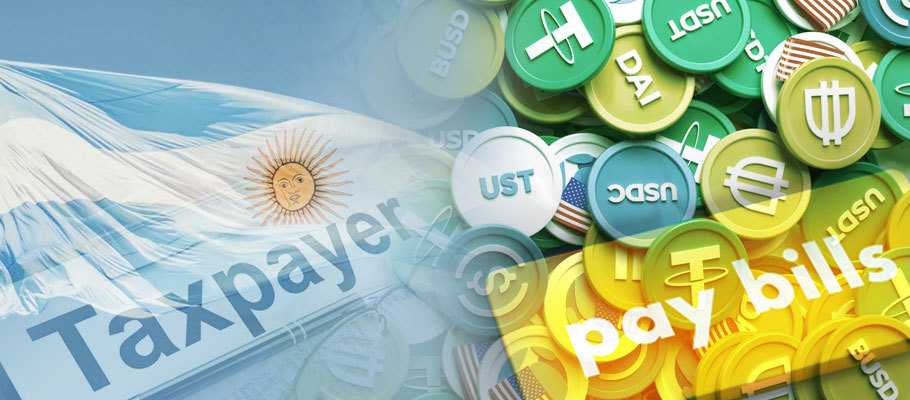
Published: August 31st, 2022
Argentina’s Mendoza province now offers payment via stablecoins for tax bills, the west-central provincial government announced this week.
The province, which borders Chile on the west, is expanding the payment options for its 1.7 million citizens in an effort to make tax payments easier and more convenient, according to a press release on the government website.
In a lengthy document explaining the process for crypto payment, the state tax authority lists MakerDAO’s DAI and Tether’s USDT stablecoins as the available options.
Taxpayers can use crypto wallets from Ripio, Lemon, Buenbit, Binance, Bitso, or Bybit amongst others. After providing ID and other preliminary information, a tool on the tax authority’s website generates a QR code users can scan with their crypto wallets.
After receiving the stablecoins, the provincial government will convert the US-dollar-pegged cryptos into Argentine pesos (ARS) and generate a receipt for the transaction.
Mendoza province is situated in western-central Argentina. The capital city is also called Mendoza. It’s Argentina’s fourth largest province by population, with over 1.7 million inhabitants.
Argentina, which has frequently seen its economy and politics roiled by political upheaval, extreme inflation, and major bankruptcies, has been cozying-up to crypto in recent months. In early August 2022 it posted a 63 per cent year-over-year inflation rate, perhaps explaining some of the Mendoza government’s enthusiasm for giving taxpayers more flexibility and choice. Cryptocurrencies have been touted by some in the country as a hedge against inflation.
With stablecoins tied to the mighty greenback, America’s relatively lower 8.5 per cent inflation rate offers a way for some Argentines to protect their household spending power.
A recent surge in Argentinian forex traders using crypto to swap ARS for USD has prompted the federal government in Buenos Aires to impose restrictions on the activity. In July 2022, the country’s central bank barred anyone buying cryptocurrency from accessing the country’s foreign exchange market, arguably in an effort to stem the tide of peso to dollar conversions.
A year ago in August 2021, Argentine president Alberto Fernandez said that he was open to the idea of crypto playing a larger role in the South American country's economy, while voicing some skepticism.
In an interview with Reuters, Fernandez said he would consider the creation of a central bank digital currency, or possibly follow northern Neighbour El Salvador’s lead and make Bitcoin one of the country's forms of legal lender.
‘I don't want to take unnecessary risks with our economy or currency, but on the face of it there is no obvious reason to say ‘no’ to a careful approach to cryptocurrency adoption.’ Experts believe cryptocurrencies are largely immune to inflationary effects, which is something we are struggling with.’
Inflation can be an explosive issue in Argentine politics. When Fernandez won the presidency in 2019, the Reuters’ World Misery Index rated Argentina the ‘second-most miserable economy in the world.’ The country also has draconian currency exchange controls, sparking a booming black market in foreign currencies. That’s very different from the situation in El Salvadoran, where the US dollar is also a form of legal tender.
Fernandez says his interest in cryptocurrencies like Bitcoin is balanced. He views them as potential tools to hedge against inflation. This week's announcement that the country’s biggest private bank has launched crypto services may be a signal that the state is adopting a more welcoming attitude to digital assets.
Interest in cryptocurrencies has grown considerably in Argentina as it it can be used to gain indirect exposure to the US dollar, a mechanism that Argentine investors have used to offset devaluation of the Argentine peso. Along with Bitcoin and Ethereum, stablecoins like DAI have found a large user base among Argentine crypto traders.
At the time of Fernandez’ crypto speech, a Bloomberg report said that a growing number of citizens and businesses were looking to Bitcoin mining, due to a mix of economic uncertainty and ample state subsidies for electricity spending.
Even when Bitcoin’s price corrected in early 2022, anyone mining from their home in Argentina still paid a fraction of the total revenue they generated.
That was, and remains, possible due to the substantial electricity subsidies Argentinians receive from the government. They are so generous that the average household electricity bill is just two to three per cent of the average monthly income. Power in other Latin American countries like Chile, Brazil, or Colombia costs almost double what it does in Argentina.
Meanwhile, Argentinians are also desperate to find alternative assets to hedge against the rampant 60-plus per cent inflation rates that have been sapping their savings and buying power. Strict exchange controls mean citizens can swap a maximum of USD 200 per month in pesos, adding to further depreciation of the Argentine ARS.
In May of this year, Buenos Aires-based Banco Galicia, Argentina's largest private bank, gave its clients access to trading services in four different cryptocurrencies, Bitcoin, Ethereum, XRP and USD Coin.
Customers immediately took to Twitter to post screenshots of the new crypto services after Banco Galicia confirmed the launch of the new services in a company blog.
"Banco Galicia launches a new and innovative service for its customers, offering the purchase, sale and custody of cryptocurrencies in a simple, secure and one-stop place," the bank said.
As the largest cryptocurrency by market cap, Bitcoin was an obvious choice for the bank, along with second-place Ethereum. Stablecoin USD Coin promised less volatility than the two main contenders as it was (purportedly) backed by hard fiat currency in the form of US greenbacks. XRP remains one of the largest cryptos by market cap and is frequently used by banks to move money quickly.
In its blog, Banco Galicia said more cryptocurrency services may be coming in the future.